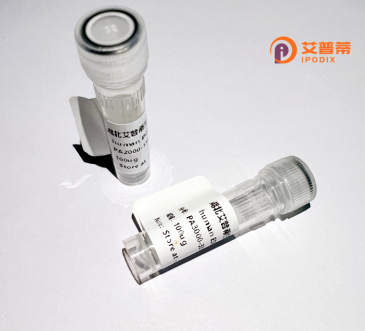
| 纯度 | >90%SDS-PAGE. |
| 种属 | Human |
| 靶点 | ATG12 |
| Uniprot No | O94817 |
| 内毒素 | < 0.01EU/μg |
| 表达宿主 | E.coli |
| 表达区间 | 1-140aa |
| 氨基酸序列 | MAEEPQSVLQ LPTSIAAGGE GLTDVSPETT TPEPPSSAAV SPGTEEPAGD TKKKIDILLK AVGDTPIMKT KKWAVERTRT IQGLIDFIKK FLKLVASEQL FIYVNQSFAP SPDQEVGTLY ECFGSDGKLV LHYCKSQAWG |
| 分子量 | 15 kDa |
| 蛋白标签 | His tag N-Terminus |
| 缓冲液 | 冻干粉 |
| 稳定性 & 储存条件 | Lyophilized protein should be stored at ≤ -20°C, stable for one year after receipt. Reconstituted protein solution can be stored at 2-8°C for 2-7 days. Aliquots of reconstituted samples are stable at ≤ -20°C for 3 months. |
| 复溶 | Always centrifuge tubes before opening.Do not mix by vortex or pipetting. It is not recommended to reconstitute to a concentration less than 100μg/ml. Dissolve the lyophilized protein in distilled water. Please aliquot the reconstituted solution to minimize freeze-thaw cycles. |
以下是关于ATG12的3篇代表性文献及其摘要概述:
1. **文献名称**:《A ubiquitin-like system mediates protein lipidation in autophagy》
**作者**:Mizushima, N., Yoshimori, T., Ohsumi, Y.
**摘要**:该研究首次阐明ATG12通过与ATG5的泛素样共价结合形成复合物,这一过程依赖类E1酶(ATG7)和类E2酶(ATG10),对自噬体的形成至关重要,揭示了自噬中蛋白质脂化的分子机制。
2. **文献名称**:《Calpain-mediated cleavage of ATG5 switches autophagy to apoptosis》
**作者**:Yousefi, S., et al.
**摘要**:研究发现钙蛋白酶切割ATG5-ATG12复合物后释放促凋亡片段,介导线粒体途径的细胞凋亡,表明ATG12相关通路在自噬与凋亡的互作中起关键调节作用。
3. **文献名称**:《ATG12 regulates mitochondrial homeostasis during chemotherapy-induced apoptosis》
**作者**:Murrow, G., Debnath, J.
**摘要**:在乳腺癌模型中证实,ATG12除自噬功能外,还通过调节线粒体膜电位和ROS水平,影响化疗药物诱导的细胞凋亡敏感性,提示其在癌症治疗中的双重作用。
4. **文献名称**:《Non-canonical ubiquitination of ATG12 regulates anti-viral immune response》
**作者**:Radoshevski, L., et al.
**摘要**:发现ATG12被TRIM21以非经典方式泛素化修饰,增强干扰素信号通路活性,表明其在抗病毒天然免疫中的新功能,扩展了ATG12在免疫调控中的生物学意义。
以上文献覆盖ATG12的结构机制、凋亡调控及免疫互作等方向,可帮助快速了解其多效性功能。
ATG12 (Autophagy-related protein 12) is a ubiquitin-like protein critical in the autophagy pathway, a conserved cellular degradation process essential for maintaining homeostasis. Unlike typical ubiquitin proteins, ATG12 does not tag substrates for proteasomal degradation but instead forms a ubiquitin-like conjugation system. It is covalently linked to ATG5 via a lysine residue in a process mediated by ATG7 (E1-like enzyme) and ATG10 (E2-like enzyme). This ATG12-ATG5 conjugate interacts with ATG16L1 to form a multimeric complex critical for autophagosome membrane elongation, a key step in sequestering cytoplasmic components for lysosomal degradation.
Recombinant human ATG12 is produced in vitro using expression systems like *E. coli* or mammalian cells, enabling studies on autophagy mechanisms and dysregulation. Its role extends beyond autophagy, influencing apoptosis, immune responses, and cellular stress adaptation. Dysfunctional ATG12 is implicated in neurodegenerative diseases (e.g., Parkinson’s), cancer, and infections, as pathogens often hijack autophagy for survival. Research on recombinant ATG12 aids in developing therapeutic strategies targeting autophagy, including drug discovery and gene therapy. Its structure-function relationships and post-translational modifications remain active research areas to elucidate context-specific regulatory mechanisms.
×